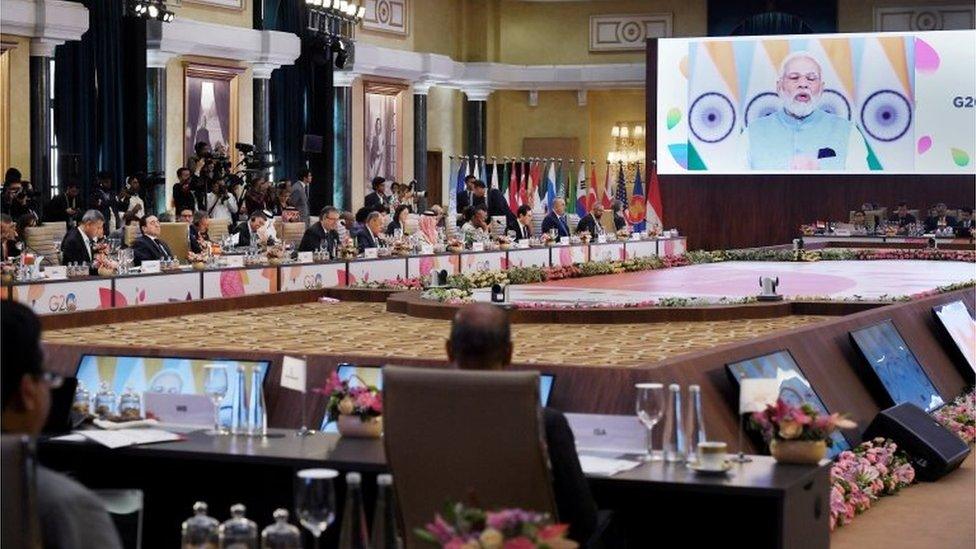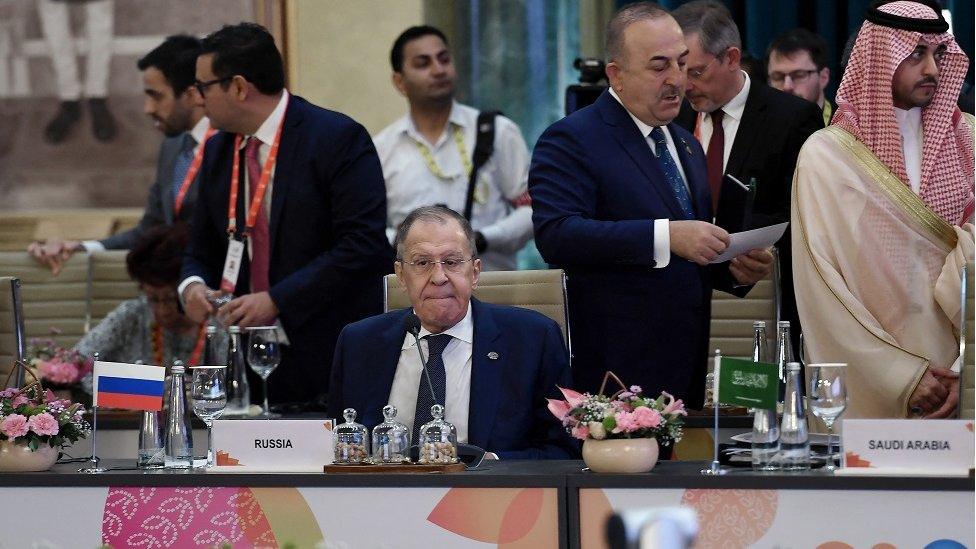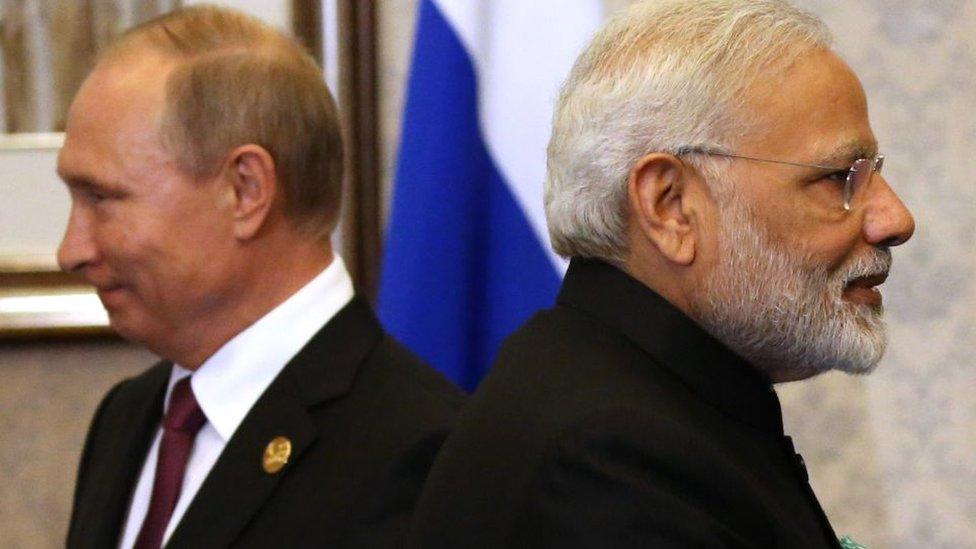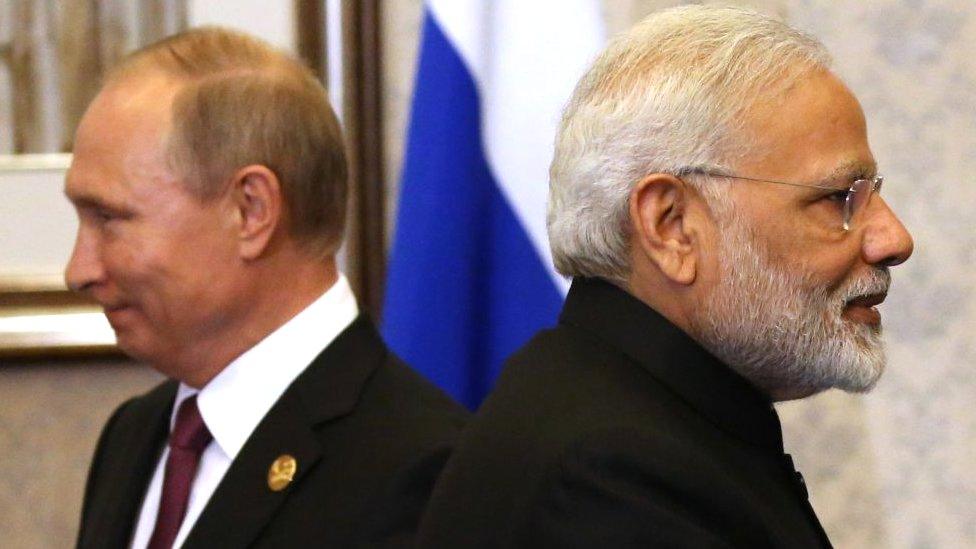India G20: Bitter divisions over Ukraine war mar talks
- Published

Mr Modi addressed ministers in English - a sign of how seriously he wanted his message taken
Angry exchanges over Russia's war in Ukraine have dominated G20 talks, with hosts India saying the disagreements mean there will be no joint statement.
The US secretary of state said the meeting had been marred by Russia's "unprovoked and unjustified war".
Russia's foreign minister accused the West of "blackmail and threats".
India had wanted to focus on other issues affecting developing nations, but it said the differences over Ukraine "could not be reconciled".
"We tried, but the gap between the countries was too much," India's foreign minister S Jaishankar said.
The G20, which includes the world's 19 wealthiest nations plus the European Union, accounts for 85% of global economic output and two-thirds of its population.
The group's foreign ministers - including Russia's Sergei Lavrov, Antony Blinken of the US and China's Qin Gang - were meeting in Delhi under India's presidency. It was the first face-to-face meeting of the top US and Russian diplomats since the war began, just over a year ago.

The Russian delegation is led by Foreign Minister Sergei Lavrov
Mr Blinken met Mr Lavrov for about 10 minutes on the sidelines and told him the West would stand by Ukraine "for as long as it takes", a senior state department official said. Mr Blinken also pressed Russia to rejoin the New Start nuclear arms control treaty that it recently withdrew from and abide by the terms.
Russian officials denied any negotiations had taken place. Earlier, Russia also accused the West of "burying" a deal to allow some Ukrainian grain exports - but the US countered by saying Moscow was hampering Ukrainian exports.
Meanwhile Russian officials said Moscow and Beijing had agreed to oppose what they called Western blackmail and threats - but this hasn't been confirmed by China.
"We speak about manners. Well, our Western counterparts have gotten really bad with these," Mr Lavrov said after Thursday's talks. "They are not thinking of diplomacy any more; they now only deal in blackmail and threatening everyone else."
Indian PM Narendra Modi had opened the session, warning that global divisions were putting sustainable development at risk.
"Many developing countries are struggling with unsustainable debts while trying to ensure food and energy security," he said.
"They are also most affected by global warming caused by richer countries."
It was a rare address by Mr Modi in English - a sign of how seriously he wanted his message to be taken. He made no direct reference to the war in Ukraine but acknowledged that discussions would be affected by geopolitical tensions.
Thursday's schedule included sessions on food security, development co-operation, terrorism and humanitarian assistance - a reflection of India's priorities while it holds the G20 presidency.
Before the talks a former Indian diplomat told the BBC India would have to "do something special" to make delegates overlook their differences on the war. Strained relations between the US and China, which has refused to oppose Russia's invasion, were also expected to test India's ability to forge a consensus.
In the end Foreign Minister Jaishankar had to present what's called a chair's summary after Thursday's talks, meaning participants had been unable to reach a joint statement. Russia and China were the only states which refused to agree to condemn the war.
But India did succeed in its main objective of raising a voice for the Global South and Mr Jaishankar said that "on the bulk of issues we were able to get an outcome document".
There are still several months left for diplomacy before G20 leaders meet in September and Delhi will hope it its presidency doesn't end on a disappointing note.
Experts say Delhi also had the delicate task of balancing its non-aligned policy on the war with pleas to other nations to find ways to work together.
India has resisted pressure and continued with its strategy of not directly criticising Russia, which is India's largest supplier of arms. It has regularly abstained from voting on UN resolutions condemning the war in Ukraine, including a vote held at the UN General Assembly last week.
It has also defended its decision to increase its oil imports from Russia, saying it has to look after the needs of its population.
But it has talked about the importance of "the UN Charter, international law, and respect for the sovereignty and territorial integrity of states" in its past statements on Ukraine.
Additional reporting by Leila Nathoo
BBC News India is now on YouTube. Click here, external to subscribe and watch our documentaries, explainers and features.

Read more India stories from the BBC:

Related topics
- Published28 February 2023

- Published3 March 2022
